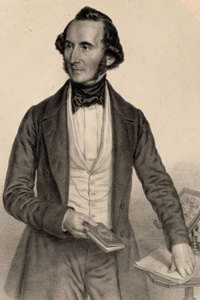Eduard Devrient
Philipp Eduard Devrient (born August 11, 1801 in Berlin , † October 4, 1877 in Karlsruhe ) was a German actor , bass-baritone singer and theater director.
Life
The Devrient family originally comes from the Lower Rhine and has Flemish roots ("De Vrient"). Eduard Devrient was the son of the businessman Tobias Philipp De Vrient and his wife Marie Charlotte Prittschow; the actors Karl August Devrient and Gustav Emil Devrient were his brothers.
Devrient learned a commercial profession, but gave it up again in 1819. Attracted by the acting fame of his uncle Ludwig Devrient , he turned - against the violent protests of his parents - to the acting profession. Musically trained in singing and figured bass by the musician Carl Friedrich Zelter , Devrient sang the main role in Carl Heinrich Graun's "Tod Jesu" in the Sing-Akademie zu Berlin as early as 1819 and made his debut as bassist at the Royal Opera Berlin , of which he was a member from 1819 to 1831 . Devrient suddenly became known when, on March 11, 1829, in Berlin with Felix Mendelssohn Bartholdy, he managed the re-performance of Johann Sebastian Bach's St. Matthew Passion with the Sing-Akademie zu Berlin. Felix Mendelssohn Bartholdy conducted the performance and Devrient sang “Jesus”. Member, later honorary member of the Sing Academy, he was 1818-1851.
In 1824 Devrient married Therese, a daughter of the businessman Simon Schlesinger; with her he had a daughter and four sons, including the future director Otto Devrient .
After a serious illness that cost him his singing voice due to overexertion, Devrient gave up his career as a singer in 1831. He went to Berlin as an actor and in 1844 to the court theater in Dresden , where he succeeded Ludwig Tieck until 1852 . Devrient set up rules for “historical costume” at the theater, some of which are still observed today. The usual course of theater rehearsals today (from the reading rehearsal to the dress rehearsal ) is also largely due to Devrient.
During this time Devrient also began to write his own plays for his theater; he also worked with colleagues, including Richard Wagner , who was court music director in Dresden at the same time. The libretto of Heinrich Marschner's opera Hans Heiling comes from Devrient's pen, he also sang the title role of Hans Heiling at the Berlin premiere on May 24, 1833. Following the example of the Conservatoire de Paris , Devrient wanted to establish a training center for actors in Germany. In doing so, he continued the theories of the “fathers of the art of acting” Wolfgang Heribert von Dalberg and Conrad Ekhof .
Devrient's theses on this topic can be found in his work History of German Dramatic Art and are partly still valid today. In 1848, the Minister of Education, Adalbert von Ladenberg, obtained detailed information from Devrient.
In the autumn of 1852 Devrient accepted a position as director of the court theater in Karlsruhe, where he was later appointed general director. There he had to reorganize the externally and internally shattered court theater and, in more than 17 years of management, he succeeded in proving the feasibility of everything that he had presented as the task of the art of acting in his dramaturgical writings. He ensured the correct and lively total effect of the representations through tireless care and didactic influence, whereby his art of dramatic reading, which had already proven itself in Berlin, Dresden, Karlsruhe and Mannheim, came to his aid.
After he had celebrated his 50th anniversary as an artist in 1869, he resigned the management for health reasons the following year. He died on October 4, 1877 in Karlsruhe. Devrient has made significant contributions as a writer for the stage.
Works
- The fair
- The gypsy
- The gray man
- The favor of the moment
- Aberrations
- Faithful love
- Hans Heiling ( libretto , composer: Heinrich Marschner )
- Das Erbe von Hohenegk (libretto, composer: Moritz Heinrich Hauser ), premiered in Leipzig in 1855
- Who am I? Leipzig 1846
- Letters from Paris (2nd edition, Berl. 1846)
- About theater schools . Berlin 1840
- The National Theater of the New Germany . Berlin 1848 ( digitized version and full text in the German text archive )
- About the Oberammergau Passion Play . Berlin 3rd edition 1880
- History of German acting (Leipzig 1848–74, 5 vols.).
- My memories of Felix Mendelssohn Bartholdy and his letters to me . Leipzig 1872
- German stage and family Shakespeare . Leipzig 1873 ff (together with his son Otto)
- A complete edition of his writings appeared in Leipzig 1846–74 (11 vols.).
literature
- Hermann Arthur Lier: Devrient, Philipp Eduard . In: Allgemeine Deutsche Biographie (ADB). Volume 47, Duncker & Humblot, Leipzig 1903, p. 669 f.
- Richter, Karl: Devrient, Eduard Philipp. In: New German Biography (NDB). Volume 3, Duncker & Humblot, Berlin 1957, ISBN 3-428-00184-2 , p. 626 f. ( Digitized version ).
- Article Eduard Devrient in: Westermannsmonthshefte , Jahresband 08 (1860), p. 430-434.
Web links
- Literature by and about Eduard Devrient in the catalog of the German National Library
- Works by and about Eduard Devrient in the German Digital Library
- Corinna Kirschstein: Devrient, Philipp Eduard . In: Institute for Saxon History and Folklore (Ed.): Saxon Biography .
- Works by Eduard Devrient in the Gutenberg-DE project
- Works by Eduard Devrient at Zeno.org .
- Devrient manuscripts in German-language libraries and archives
- Eduard Devrient's autographs in the digital collections of the Badische Landesbibliothek
| personal data | |
|---|---|
| SURNAME | Devrient, Eduard |
| ALTERNATIVE NAMES | Devrient, Philipp Eduard (full name) |
| BRIEF DESCRIPTION | German actor, singer and theater director |
| DATE OF BIRTH | August 11, 1801 |
| PLACE OF BIRTH | Berlin |
| DATE OF DEATH | October 4, 1877 |
| Place of death | Karlsruhe |


